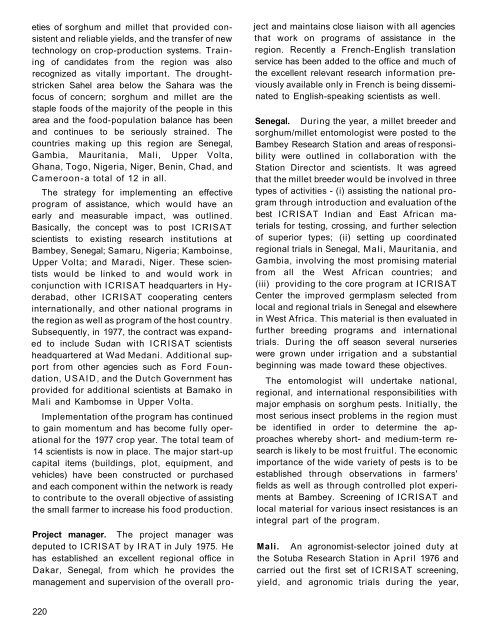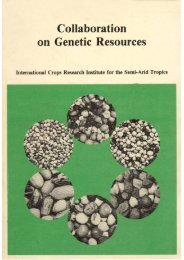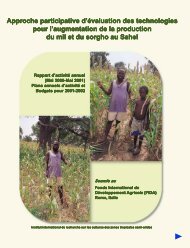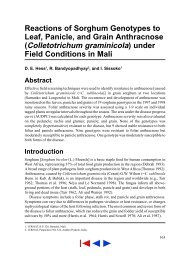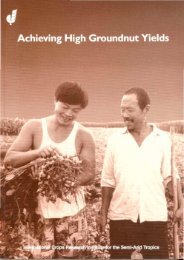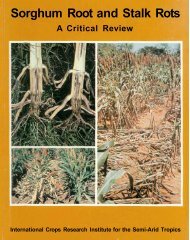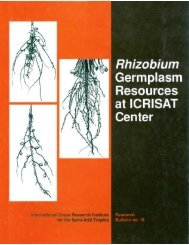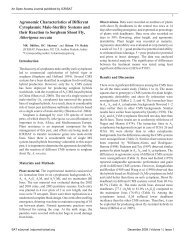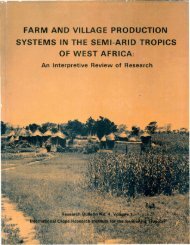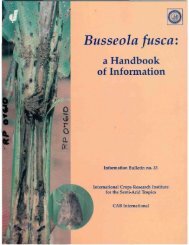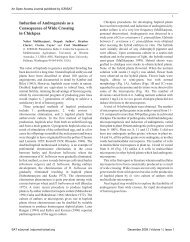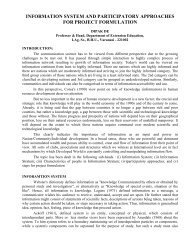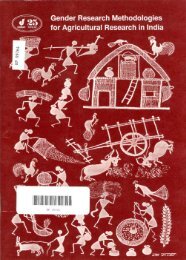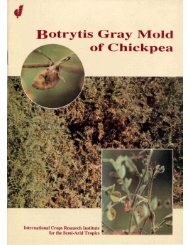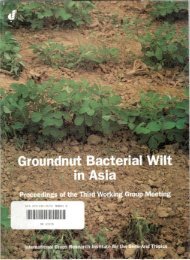Create successful ePaper yourself
Turn your PDF publications into a flip-book with our unique Google optimized e-Paper software.
eties of sorghum and millet that provided consistent<br />
and reliable yields, and the transfer of new<br />
technology on crop-production systems. Training<br />
of candidates from the region was also<br />
recognized as vitally important. The droughtstricken<br />
Sahel area below the Sahara was the<br />
focus of concern; sorghum and millet are the<br />
staple foods of the majority of the people in this<br />
area and the food-population balance has been<br />
and continues to be seriously strained. The<br />
countries making up this region are Senegal,<br />
Gambia, Mauritania, Mali, Upper Volta,<br />
Ghana, Togo, Nigeria, Niger, Benin, Chad, and<br />
Cameroon-a total of 12 in all.<br />
The strategy for implementing an effective<br />
program of assistance, which would have an<br />
early and measurable impact, was outlined.<br />
Basically, the concept was to post ICRISAT<br />
scientists to existing research institutions at<br />
Bambey, Senegal; Samaru, Nigeria; Kamboinse,<br />
Upper Volta; and Maradi, Niger. These scientists<br />
would be linked to and would work in<br />
conjunction with ICRISAT headquarters in Hyderabad,<br />
other ICRISAT cooperating centers<br />
internationally, and other national programs in<br />
the region as well as program of the host country.<br />
Subsequently, in 1977, the contract was expanded<br />
to include Sudan with ICRISAT scientists<br />
headquartered at Wad Medani. Additional support<br />
from other agencies such as Ford Foundation,<br />
USAID, and the Dutch Government has<br />
provided for additional scientists at Bamako in<br />
Mali and Kambomse in Upper Volta.<br />
Implementation of the program has continued<br />
to gain momentum and has become fully operational<br />
for the 1977 crop year. The total team of<br />
14 scientists is now in place. The major start-up<br />
capital items (buildings, plot, equipment, and<br />
vehicles) have been constructed or purchased<br />
and each component within the network is ready<br />
to contribute to the overall objective of assisting<br />
the small farmer to increase his food production.<br />
Project manager. The project manager was<br />
deputed to ICRISAT by I R A T in July 1975. He<br />
has established an excellent regional office in<br />
Dakar, Senegal, from which he provides the<br />
management and supervision of the overall project<br />
and maintains close liaison with all agencies<br />
that work on programs of assistance in the<br />
region. Recently a French-English translation<br />
service has been added to the office and much of<br />
the excellent relevant research information previously<br />
available only in French is being disseminated<br />
to English-speaking scientists as well.<br />
Senegal. During the year, a millet breeder and<br />
sorghum/millet entomologist were posted to the<br />
Bambey Research Station and areas of responsibility<br />
were outlined in collaboration with the<br />
Station Director and scientists. It was agreed<br />
that the millet breeder would be involved in three<br />
types of activities - (i) assisting the national program<br />
through introduction and evaluation of the<br />
best ICRISAT Indian and East African materials<br />
for testing, crossing, and further selection<br />
of superior types; (ii) setting up coordinated<br />
regional trials in Senegal, Mali, Mauritania, and<br />
Gambia, involving the most promising material<br />
from all the West African countries; and<br />
(iii) providing to the core program at ICRISAT<br />
Center the improved germplasm selected from<br />
local and regional trials in Senegal and elsewhere<br />
in West Africa. This material is then evaluated in<br />
further breeding programs and international<br />
trials. During the off season several nurseries<br />
were grown under irrigation and a substantial<br />
beginning was made toward these objectives.<br />
The entomologist will undertake national,<br />
regional, and international responsibilities with<br />
major emphasis on sorghum pests. Initially, the<br />
most serious insect problems in the region must<br />
be identified in order to determine the approaches<br />
whereby short- and medium-term research<br />
is likely to be most fruitful. The economic<br />
importance of the wide variety of pests is to be<br />
established through observations in farmers'<br />
fields as well as through controlled plot experiments<br />
at Bambey. Screening of ICRISAT and<br />
local material for various insect resistances is an<br />
integral part of the program.<br />
Mali. An agronomist-selector joined duty at<br />
the Sotuba Research Station in April 1976 and<br />
carried out the first set of ICRISAT screening,<br />
yield, and agronomic trials during the year,<br />
220


